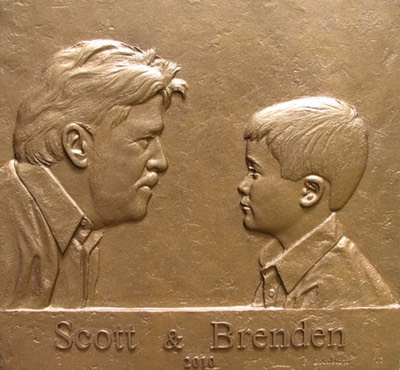SHADOW
is defined as an aspect of the unconscious mind that acts as a dynamic repository. A repository for behaviors that we were either punished for or there was some other emotional trauma associated with the acting out. These specific behaviors were relegated to the shadow and then only acknowledged in other people.
This is the beginning of PROJECTION (see the developing shadow above).
The filling of the shadow repository begins at birth. As an infant we repeat this cycle endlessly. With each cycle, minute family behaviors take on import. They determine how to survive in this family. Later as adults, they show up most obviously in our preferences. Even on the job we must work at fitting in, to behave correctly.
The UNKNOWN aspect of the unconscious is created and strengthened when the search-to-find pattern is altered. It registers as "my search must have been wrong." If mother did not come when I whimpered, I accelerate the search with a scream. This acceleration of searching behavior continues into adult life as the way to get seen.
Our patterns of relaxing, sleeping, waking and searching begin to alter as we instinctually try to survive disruptions in simple attention getting patterns. This is the conditioning process every child goes through.
As we mature into adolescence the shadow takes on a dominant role in how we interact with others. As can be seen above, the survival child, and the two wounds become obscured, though no less powerful. The shadow makes it’s influence known to us through our strong reactions, opinions, and preferences for what is "right and wrong" in other peoples behavior.
PROJECTION
is defined as the release from the psyche (shadow) of a characteristic, a behavior we don’t want others to see in us, on to another person, who is in fact acting out that behavior.
This is what makes it so difficult to see the projected characteristic in us. The other person is physically/emotionally acting out and we are not. People around us also agree that the object of our projection, the person, is acting angry, uncooperative, territorial or defensive. How could it be the projector who is the problem?
THE KEY
to this is the
feeling
we are left with after we project. The feeling is either:
1. I feel better about myself - more value. We may say, "At least I’m not like them!"
2. I feel less good about myself - less value. "I wish I could be like them!"
An example will illustrate.
1. I see a person who weighs more than I do. I feel good about myself.
2. I see a person who weighs less that I should. I feel less satisfied with how I look.
Here is another
KEY
that takes this to another level. The person being projected on (angry, overweight, incompetent, rude, ugly, etc.) has felt this projections all their life. The projection is familiar, contributes to their low self-esteem and subdues them into doing the very behavior that you are projection.
Copyright © 2020 Scott Taylor Consulting All Rights Reserved.
